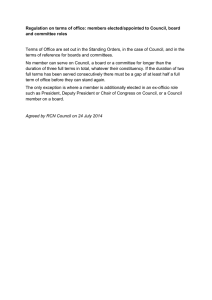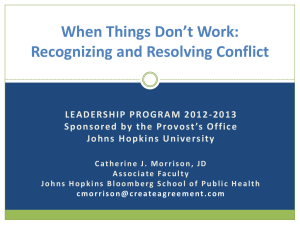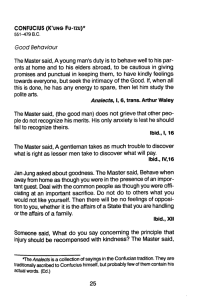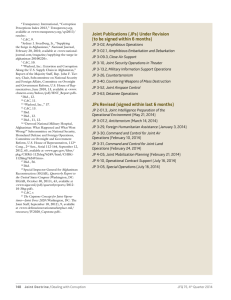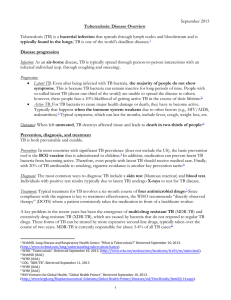Rules of Procedure of AFICS/NY (MS Word)
advertisement
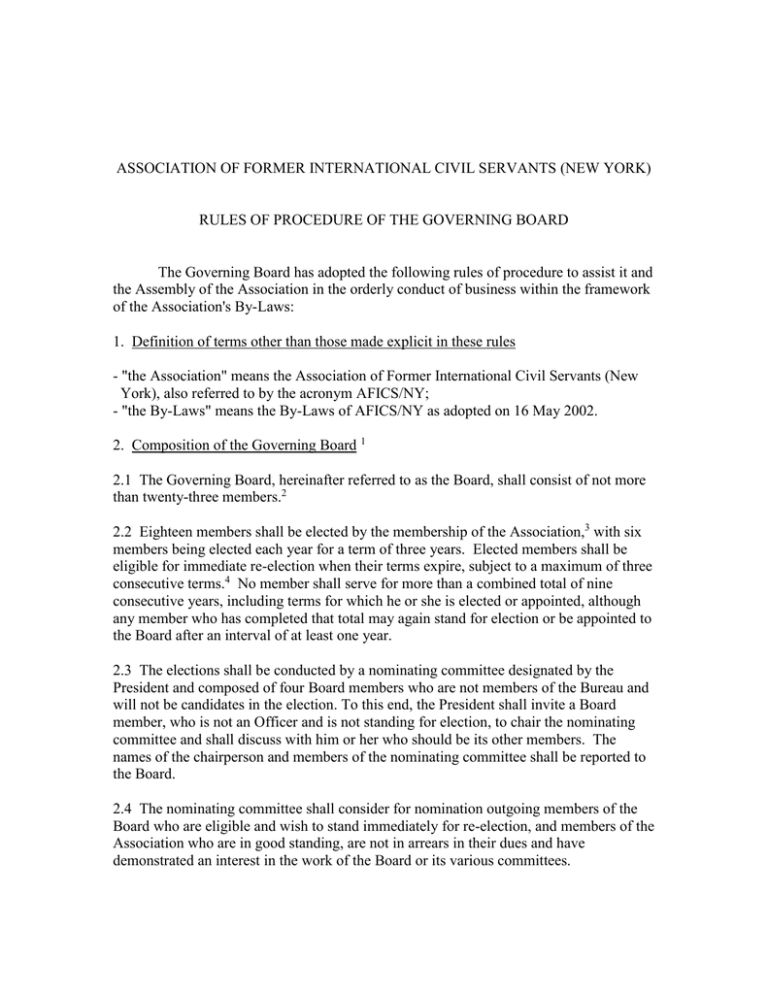
ASSOCIATION OF FORMER INTERNATIONAL CIVIL SERVANTS (NEW YORK) RULES OF PROCEDURE OF THE GOVERNING BOARD The Governing Board has adopted the following rules of procedure to assist it and the Assembly of the Association in the orderly conduct of business within the framework of the Association's By-Laws: 1. Definition of terms other than those made explicit in these rules - "the Association" means the Association of Former International Civil Servants (New York), also referred to by the acronym AFICS/NY; - "the By-Laws" means the By-Laws of AFICS/NY as adopted on 16 May 2002. 2. Composition of the Governing Board 1 2.1 The Governing Board, hereinafter referred to as the Board, shall consist of not more than twenty-three members.2 2.2 Eighteen members shall be elected by the membership of the Association,3 with six members being elected each year for a term of three years. Elected members shall be eligible for immediate re-election when their terms expire, subject to a maximum of three consecutive terms.4 No member shall serve for more than a combined total of nine consecutive years, including terms for which he or she is elected or appointed, although any member who has completed that total may again stand for election or be appointed to the Board after an interval of at least one year. 2.3 The elections shall be conducted by a nominating committee designated by the President and composed of four Board members who are not members of the Bureau and will not be candidates in the election. To this end, the President shall invite a Board member, who is not an Officer and is not standing for election, to chair the nominating committee and shall discuss with him or her who should be its other members. The names of the chairperson and members of the nominating committee shall be reported to the Board. 2.4 The nominating committee shall consider for nomination outgoing members of the Board who are eligible and wish to stand immediately for re-election, and members of the Association who are in good standing, are not in arrears in their dues and have demonstrated an interest in the work of the Board or its various committees. 2 2.5 Candidates may also be submitted in nominating petitions signed by not fewer than twenty members of the Association and received at least ninety days before the annual meeting of the Assembly.5 2.6 Candidates who accept nomination by the nominating committee or by members of the Association shall be asked to submit a biographic note stating, inter alia, the services they have rendered or believe they can render to the Association and indicating in which committee or committees they wish to serve. The notes shall be edited for consistency by the nominating committee, and the final text will be shown to the candidate concerned to ensure accuracy. 2.7 The elections shall be by secret ballot.6 Ballot papers containing the names of the candidates, as well as the biographic notes and voting instructions, shall be distributed in advance of the annual meeting of the Assembly. Voting members shall indicate their choices on the ballots and return them in specially provided balloting envelopes to the Association's offices. Ballots shall be receivable up to one week before the opening of the annual meeting of the Assembly. 2.8 The nominating committee shall open the ballot envelopes and tally the votes, and shall announce the results of the election at the annual meeting of the Assembly. The six candidates who receive the largest number of valid votes shall be declared elected. 2.9 The term of office of newly elected members of the Board shall commence as from the first meeting of the new Board, which shall be convened as soon as possible following the annual meeting of the Assembly, and in no case later than three weeks after that date. It shall expire immediately before such meeting three years later. 2.10 Up to five additional members may be appointed, for any term not exceeding three years, by the Board by a majority vote.7 The appointment shall normally be for one year at a time. 2.11 The Board may in like manner fill a vacancy in its membership for the remainder of an unexpired term,8 up to two months before the date of expiration of that term. 2.12 Members to be appointed under 2.10 and 2.11 above shall be proposed by the President with a statement of the reasons supporting the proposal. Approval of the proposal shall require a majority of the duly convened Board members present and voting. 2.13 Members appointed as provided for in 2.10, 2.11 and 2.12 above shall have rights equal to those of elected members. The term of office of members appointed in this manner shall commence on the date the Board approves the appointment, and shall expire in the year decided by the Board on the date of expiration of the term of elected members. 2.14 Every member of the Board shall be a member of at least one of its standing committees. 3 2.15 The resignation of any member of the Board shall be addressed in writing to the President. 2.16 Any elected or appointed member of the Board who fails to attend three consecutive Board meetings without adequate reasons shall be considered by the Board as having resigned therefrom and shall be so notified.9 2.17 In addition to the elected and appointed members, the Board may elect honorary members. 2.18 Candidates for election as honorary members, who must be persons who have served for three consecutive terms as elected members of the Board and have made a generally recognised outstanding contribution, shall be nominated by the President for approval by the Board. 2.19 Honorary members of the Board shall have all the rights of elected or appointed members except the right to vote. They shall not be considered as having resigned from the Board, in accordance with 2.16 above, for failure to attend Board meetings. 2.20 The Board may decide, after due consideration and notification process, to suspend or remove a member whose behaviour is deemed incompatible with the high ethical standards expected of Board members. 3. Meetings of the Governing Board 3.1 Meetings of the Board shall be called by the President, and notice of such meetings shall normally be sent to the members at least one week beforehand, together with a provisional agenda drawn up by the President and any documents available at the time as would facilitate consideration and action at the meeting. At the beginning of each meeting the Board shall adopt its agenda. 3.2 Any member of the Board may propose items for inclusion in the provisional agenda. These proposals shall normally be submitted to the President at least two weeks before the date of the meeting. 3.3 Meetings of the Board shall normally be held on the third Tuesday of every month. The President may call additional meetings whenever such action is required by events. The agenda for such meetings shall be limited to the issues for which they are convened. 3.4 The attendance of one half of the voting members of the Board shall constitute a quorum.10 In the absence of a quorum, the President shall decide whether to adjourn the meeting to another proximate date, or to hold the meeting after advising the members present that because of the absence of a quorum any decisions taken shall be subject to ratification. 4 3.5 In the absence of a consensus, the Board shall take its decisions by a simple majority vote of the members present and voting at a duly constituted meeting.11 3.6 The Board may invite other members of the Association, as well as non-members, to attend its meetings. Chairpersons and co-chairpersons of committees of the Board who are not members of the Board, as well as the President of the AFICS/NY Charities Foundation and the Editor of the AFICS/NY Bulletin, shall normally be invited to meetings of the Board. They may participate in its discussions, but shall not have the right to vote. 3.7 Minutes of each meeting of the Board shall be drawn up by the Secretary or the Deputy Secretary or another designated person and circulated in draft form to the members of the Board in advance of the following meeting, under the authority of the President. Board members wishing to make changes to the draft minutes should normally communicate those changes to the drafter before the following meeting, at which time a final version of the minutes shall be adopted. Only statements actually made during a meeting shall be reflected in the minutes. 4. Officers of the Association 4.1 The Officers of the Association, who shall constitute the Bureau of the Governing Board, shall be the following: a President, a First Vice-President, a Second VicePresident, a Secretary, a Treasurer, a Deputy Secretary and a Deputy Treasurer.12 4.2 The Officers shall be elected by the Board from among its members13 and shall have a term of office of one year, at the end of which they will be immediately eligible for reelection as long as they remain members of the Board. 4.3 The Officers shall be elected at the first meeting of each newly constituted Board, which shall be called by the retiring President as soon as possible after the annual meeting of the Assembly, as stipulated in 2.9 above, bearing in mind the time required for candidacies to be put forward. 4.4 Candidates for posts of Officer shall be nominated by a member of the Board, with the nomination being seconded by at least one other member. The Officers shall be elected by a majority vote of members present and voting. 4.5 The President shall lead the Association, shall be its primary representative and spokesperson and shall exercise general direction of the Bureau. He or she shall decide on the provisional agenda of Board meetings, shall chair such meetings and be responsible for the implementation of the resolutions and decisions of the Board. In like manner, he or she shall draw up the draft agenda of the annual meeting of the Assembly for approval by the Board, and shall preside over said meeting. The President shall be a member ex officio of all committees established by the Board. He or she shall also be responsible for the management of the AFICS/NY offices and shall oversee the preparation, publication and distribution of the AFICS/NY Bulletin. 5 4.6 The First and Second Vice-Presidents shall assist the President in his or her functions. The President may assign to each of the Vice-Presidents special responsibilities for specific areas of work of the Association. 4.7 In the event of the absence or disability of the President, the First Vice-President shall perform the functions of the President. If both the President and the First VicePresident are absent or disabled, the Second Vice-President shall perform said functions. The Acting President shall have such powers and responsibilities as pertain to the President until the President resumes his or her functions or until the Board elects new Officers. 4.8 The Secretary shall draw up minutes of the meetings of the Board and of the Assembly, record votes and decisions, circulate documents to be considered at such meetings and assist the President and the Vice-Presidents as required. The Deputy Secretary shall assist the Secretary and replace that Officer in his or her functions as necessary. 4.9 The Treasurer shall be responsible for the sound financial administration of the Association. He or she shall prepare annual financial statements for submission to the auditors, and submit audited financial statements for approval by the Assembly in accordance with Article IV,4,(c) of the By-Laws. The Treasurer shall advise the Board regularly on the financial situation of the Association, and prepare the Association's budget for the approval of the President. The Deputy Treasurer shall assist the Treasurer and replace that Officer in his or her functions as necessary. 5. Officials of the Association 14 5.1 The Board shall also have authority to designate other officials of the Association, from within its own membership or from the membership of the Association at large, including but not limited to, liaison officers, representatives of local chapters of the Association and editors of the AFICS/NY Bulletin. 6. Convening of the Assembly 6.1 The Board shall convene the Assembly of the Association on the third Thursday of May of each year, unless, for reasons it deems important, it fixes another date.15 6.2 The Board may also convene extraordinary meetings of the Assembly, on its own decision or upon receipt of a written request from at least fifty members of the Association.16 6.3 The Board shall prepare the agenda for all meetings of the Assembly.17 Notice of the annual meeting, together with nominations for election to the Board, shall be distributed to all members of the Association not less than thirty days in advance of the meeting. 6 Notice of the time, place and agenda for any extraordinary meeting shall be distributed to all members of the Association not less than fourteen days in advance of the meeting.18 6.4 At the annual meeting, the Board shall present to the Assembly a report on the activities of the Association as well as annual financial statements.19 7. Standing and other committees 20 7.1 The Board shall establish standing committees, including their mandates and terms of reference, to facilitate its work on specific subjects.21 The President shall appoint members of newly created standing committees from the membership of the Association, including the membership of the Board, on the basis of their interests and qualifications.22 Once such committees are established, the President may delegate to their leadership the appointment of members. 7.2 The President shall designate a chairperson pro tem of any new standing committee who shall convene the first meeting, at which the members shall elect a chairperson or two co-chairpersons.23 The chairperson or a co-chairperson of each committee shall report on its work to the Board as often as necessary and at least once every three months, and at any time that he or she considers it useful to inform the Board or seek its guidance. The chairperson or co-chairpersons of standing committees shall prepare an annual report for publication in the Bulletin prior to the annual meeting of the Assembly.24 7.3 The Board may also establish ad hoc committees to address specific and timelimited issues. The President shall appoint members of such committees from the membership of the Board and of the Association. 7.4 Committees shall establish their own quorums and other rules as appropriate.25 7.5 The President, at his or her initiative or upon the advice of a committee’s leadership, may remove a member from a committee if it is deemed that his or her behaviour is detrimental to the purposes of the Committee or the Association. 7.6 The Board may dissolve a committee if it deems it is no longer necessary or has ceased to serve its purpose. 8. Amendment or suspension of the Rules of Procedure 8.1 These Rules of Procedure may be amended or suspended by a decision of the Board. 1 2 3 By-Laws, Article V, paragraphs 1, 2 and 3. Ibid., Art.V, 1. Ibid., Art.V ,1. 7 4 Ibid., Art.V, 1 (a). Ibid., Art.V, 1 (b). 6 Ibid., Art.V, 1 (b). 7 Ibid., Art.V, 2. 8 Ibid., Art.V, 2. 9 Ibid., Art.V, 3. 10 Ibid., Art.V, 8. 11 Ibid., Art.V, 9. 12 Ibid., Art.V, 4. 13 Ibid., Art.V, 4. 14 Ibid., Art.V, 4. 15 Ibid., Art. IV, 1. 16 Ibid., Art. IV, 3. 17 Ibid., Art.V, 6 (b). 18 Ibid., Art.V, 2 and 3. 19 Ibid., Art. IV, 2 and 4 (c). 20 Ibid., Art.VI. 21 Ibid., Art.VI, 1. 22 Ibid., Art.VI, 2. 23 Ibid., Art.VI, 3. 24 Ibid., Art.VI, 4. 25 Ibid., Art.VI, 5. 5
